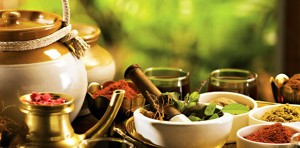Ayurveda Tips for Winter
 Ayurveda means the science of life. The seasons have a great effect on us. In the beginning of the winter months we move into the vata phase or a time when the airy aspect of the universe is dominant. Vata season brings dryness and cold. It can also be a time of erratic movement. In Ayurveda we focus on the term “like increase like”,we want to bring in the gunas of the opposite quality so we can balance out the vata elements. We can start to imagine what will bring in the qualities of warm, moist, and slow. We want to have a special ritual or routine for each season to help bring our doshas (elements) into balance. The seasonal ritual or routine is called ritucharya. We also have a daily self care practice called dinacharya. Having a self care practice that grounds and connects us to the present moment is a vital part of yogic health and vitality.
Ayurveda means the science of life. The seasons have a great effect on us. In the beginning of the winter months we move into the vata phase or a time when the airy aspect of the universe is dominant. Vata season brings dryness and cold. It can also be a time of erratic movement. In Ayurveda we focus on the term “like increase like”,we want to bring in the gunas of the opposite quality so we can balance out the vata elements. We can start to imagine what will bring in the qualities of warm, moist, and slow. We want to have a special ritual or routine for each season to help bring our doshas (elements) into balance. The seasonal ritual or routine is called ritucharya. We also have a daily self care practice called dinacharya. Having a self care practice that grounds and connects us to the present moment is a vital part of yogic health and vitality.
We want to use this time to strenghten the dhatus or 7 tissues (plasma, muscle, fat, bone, reproductive fluid, blood and bone marrow/nerve). With these practices we can build dhatu health and ojas (our immunity, vitality, and juiciness).
1. Move – Start your day off with movement to avoid the stagnation and congestion we can have in the winter months. Yoga, walking, rebounding and biking are great ways to wake up the body.
2. Nasya – Use a small amount of sesame oil or olive oil inside the nose. This is an important practice to avoid the dry nose from the forced air and extremely cold temperatures. There are different types of nasya therapy. This is simply applying oil to the finger and inside the nose for lubrication, stress and even eye, ear and nose health.
3. Abhyanga – Self daily oil massage for muscle nourishment is an amazing ritual. Apply the warm oil all over the body. A good way to apply the oil is in a circular motion over joints and round areas like the stomach and straight strokes for your arms and legs. Use a good amount of oil. Sesame oil is great for winter as it has warming properties. Coconut oil is better used in the summer for its cooling properties. If you have a tendancy to over heat perhaps use a more neutral oil like sunflower or grapeseed oil. Use organic oils only and try a test patch to check for allergies. Warming and decongesting essential oils can be added to the base oils (sesame, sunflower) to help bring more heating properties. Think black pepper, rosemary, cardamon, ginger, juniper, ect. Use only a couple drops with your base oil(sesame). This practice has changed the way my muscles feel in the winter. My body has sense of cohesiveness and deep nourishment with this practice. Try to let the oils penetrate for a least 15 minutes before your bath or shower, or leave on for a few hours for a luxurious treat.
4. You are what you eat – Eating at the same time each day is great for balancing your nervous system. We want to be eating warm nourishing foods. Watch that you are not over doing the heat with too much cayenne pepper or ginger and hot spices as these can be very drying. Use warming herbs like cinnamon, cloves, black pepper, cumin, basil, nutmeg… Avoid ice water, ice cream, too much cold food and heavy dairy. Choose root vegetables, stews, and soups with aromatic herbs. Use your mortar and pestle to grind your spices and enjoy the smells of nature in this time. Our digestive fire (agni) is strongest in the winter, tap into that internal warmth we create.
5. Taking steam – A great way to bring in humidity into the air is a humidifier. You can also use kettles or boiling water in a pinch. There is also the practice of steam showers or swedana treatments that use herbal steams or a steam after abhyanga massage.
6. Cover your ears and neck for protection in the windy winter months.
Most importantly diving into the winter months with a self care practice you can sustain with a sense of play and curiousity and most importantly a keen sense of intuition and self inquiry. Enjoy the increasing light.
Join me this April 2014 for more Ayurveda and Yoga with the Yoga Lifestyle Course. Our Yoga Lifestyle Course Starts April 1oth, 2014. For more information or to register go to www.yogahaven.ca/courses
Happy Winter! – Lori Lee
